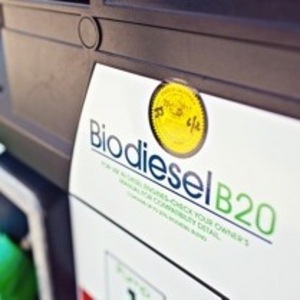Iowa law ensures retailers' rights to offer higher biofuel blends

May 23, 2013
BY Ron Kotrba
The Iowa legislature passed H.F. 640 on May 22, legislation that protects retailers from Big Oil efforts to restrict competition by guaranteeing local retailers the right to offer the ethanol and biodiesel blends of their choice, such as B20 biodiesel.
The Petroleum Marketers and Convenience Stores of Iowa (PMCI) said of the news that Iowans and the state’s economy will benefit from the legislation, protecting the long-standing practice of locally blending biofuel products. Fuel distributors and retailers led lobbying efforts to pass the new law requiring major oil refiners to offer Iowa businesses unblended gasoline and diesel, so they can locally blend ethanol and biodiesel products manufactured in Iowa.
Advertisement
Advertisement
In Iowa, retailers and distributors have been selling various blends of ethanol and biodiesel to customers. As the federal renewable fuels standard (RFS) mandates higher sales of renewable fuels, Iowa marketers will continue to play a vital role in supporting the RFS and doing its part to make renewable fuels available to customers.
“This legislation helps Iowa farmers, Iowa businesses and Iowa consumers by maintaining competitive fuel prices and promoting the state’s leadership position in biofuel production,” said Dawn Carlson, president of PMCI. “Petroleum retailers in Iowa have led the way in renewable fuels blending and marketing for more than 30 years. Last night, state lawmakers did great work protecting the interests of all Iowans and ensuring that we will be able to continue offering Iowa-produced fuels.”
Advertisement
Advertisement
The legislation includes a section that the Iowa Renewable Fuels Association says amounts to a retailer “Bill of Rights,” preventing oil refiners’ supply agreements from directly or indirectly limiting the ability of local retailers to offer the ethanol and biodiesel blends they choose. The provision was based on a law enacted in South Dakota in 2011 and addresses specific, anticompetition provisions from actual refiner supply agreements. As a result, new supply agreements will not be allowed to restrict a number of things, including fuels from other suppliers, installing blender pumps, using current equipment from offering higher biodiesel and ethanol blends, ethanol or biodiesel blends from being advertised, the locations where a retailer may offer the higher blends (such as under a canopy), or payment for higher blends to cash-only.
“This legislation represents a solid step forward for higher ethanol blends, consumer choice, and the federal RFS,” stated IRFA President Rick Schwarck, who is also CEO of Absolute Energy, a 115 MMgy ethanol refinery. “I find it ironic that Big Oil consistently claims that retailers don’t want to sell higher ethanol blends like E15, yet they use every trick in the book to prevent retailers from offering E15. In fact, the American Petroleum Institute fought tooth and nail to try to keep these retailer protections out of the bill. This bill tears down one part of Big Oil’s bogus blend wall in Iowa.”
Iowa has 12 biodiesel facilities with the capacity to produce nearly 315 million gallons a year.
Related Stories
A group of 16 senators, led by Sens. Chuck Grassley, R-Iowa, and Amy Klobuchar, D-Minn., on April 8 sent a letter to U.S. EPA Administrator Lee Zeldin urging the agency to increase RVO and account for SREs in the agency’s upcoming RFS rulemaking.
A group of small refineries on April 4 sent a letter to President Donald Trump urging him “to sent the multi-national oil and biofuels companies back to the drawing board to come up with a biofuels policy that does no harm.”
The U.S. Department of Commerce has disbanded an advisory committee that provided the agency with private sector advice aimed at boosting the competitiveness of U.S. renewable energy and energy efficiency exports, including ethanol and wood pellets.
Iowa’s Renewable Fuels Infrastructure Program on March 25 awarded nearly $3 million in grants to support the addition of E15 at 111 retail sites. The program also awarded grants to support two biodiesel infrastructure projects.
Effective April 1, Illinois’ biodiesel blend requirements have increased from B14 to B17. The increase was implemented via a bipartisan bill passed in 2022, according to the Iowa Soybean Association.
Upcoming Events










